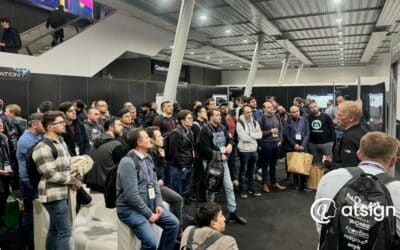ARTICLE
IoT Device Cybersecurity Using the atPlatform
Device Security
IoT cybersecurity attacks are on the rise. Vendor disclosures of IoT device vulnerabilities are noted to have increased by 57% in the first half of 2022, following research by Claroty, a cybersecurity leader. Not only is this a severe risk to IoT manufacturers’ networks, but also to the billions and billions of data points from customers using connected devices. In response to these security risks, the European Union recently proposed the Cyber Resilience Act, requiring IoT device manufacturers to secure their products before they reach the market.
The EU draft law proposes that IoT devices will need to be secure from inception through to the end of the device’s lifetime. Thierry Breton, EU commissioner for the internal market, is pushing for more stringent cybersecurity standards, citing that, “Today most of the hardware and software products are not subject to any cyber security obligations.” With billions of potential connected devices, the need for maintenance is critical.
This legislation may pose a stark challenge for device manufacturers in a bid that some see as stifling the push for new and innovative products to market. However, this does not need to be the case. With the atPlatform, IoT manufacturers can stem the rising tide of IoT breeches, and lock down their devices in compliance with the proposed legislation.

Atsign IoT
Atsign built the atPlatform to be a simple and secure solution for legislation like GDPR(General Data Protection Regulation), CCPA(California Consumer Privacy Act), and the newly proposed Cyber Resilience Act, allaying the concerns of device manufacturers. The atPlatform operates on these tenets:
- Zero Trust
- Zero Attack Surface
- Zero Static IP Addresses
- Zero Open Ports
- Zero Firewalls
- Zero VPNs
How is the atPlatform different?
The current solution of adding layer after layer of security platforms (firewalls, VPNs, etc.) is cumbersome, expensive, and ultimately ineffective. That’s why the atPlatform starts at the protocol level. Because all connections from the device are outbound, the atProtocol eliminates the need for firewalls and VPNs, thus solving the problem of complex configuration and administration. The cost savings of implementing the atPlatform are apparent when considering the current standard of having to maintain the security of VPNs and firewalls over a device’s lifetime.
Atsign is eminently equipped to help software developers and device manufacturers transition to the new cybersecurity standards proposed by the EU. All things considered, with the push for more global standards in the wake of GDPR and CCPA, there is no better time to implement the open-source technology offered by Atsign.
Join the Community
Piqued your interest? Can’t wait to get started? Check out our architecture, and email us at iot@atsign.com to schedule a demo to see the open-source atPlatform in action.
Stay engaged by following our social channels to stay informed on IoT & Atsign:
https://twitter.com/atsigncompany
https://www.youtube.com/c/AtsignCo
Sources:
https://www.helpnetsecurity.com/2022/08/29/vulnerability-disclosures-iot-devices/
https://www.theregister.com/2022/09/16/eu_cyber_resilience_act/
Photo by Robin Glauser on Unsplash.
Business Agility and Happy IT – You Can Have It All!
Simplify IT with Atsign’s open-source Networking 2.0 technology, all without needing to replace existing systems.
Networking 2.0, Say Goodbye to “Zero Trust.”
Atsign CEO and Co-founder, Barbara Tallent, explains how Networking 2.0 is the simpler way to secure your network and devices.
Prevention is the Untapped Solution to Cybersecurity Needs
Anthony Prakash reveals how prevention is the solution to cybersecurity problems, with Networking 2.0 technology paving the way.
Atsign Granted Patent for the atProtocol
Atsign was granted a patent for the atProtocol, a revolutionary, open-source, Networking 2.0 technology.
Atsign at BlackHat Europe
Atsign attended BlackHat Europe, showcasing Networking 2.0 technology with the award-winning remote access tool, SSH No Ports.




